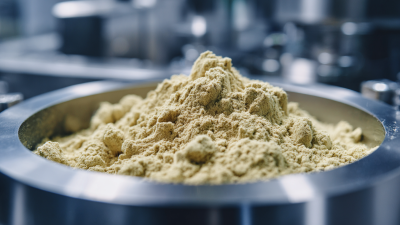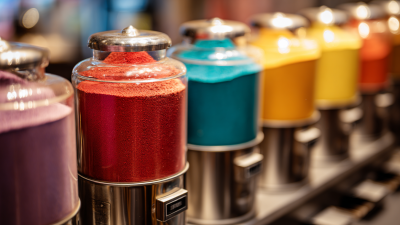
Blog
How to Choose the Right Capsules Filling Machine for Your Production Needs
In the ever-evolving pharmaceutical and nutraceutical industries, the demand for efficient and reliable production has never been higher. A recent report by Grand View Research estimates that the global capsule filling machines market size will reach USD 1.24 billion by 2027, growing at a CAGR of 6.5%. This surge in growth underscores the importance of selecting the right Capsules Filling Machine to meet specific production needs.

As manufacturers face increasing pressures for higher output, compliance with stringent regulatory standards, and the need for versatility to accommodate various formulations, understanding the types of capsules filling machines available on the market becomes crucial. In this blog, we will explore the key factors to consider when choosing a Capsules Filling Machine, ensuring your production line not only keeps pace with industry demands but also leads the charge in innovation and quality.
Understanding Different Types of Capsule Filling Machines and Their Applications
When selecting a capsule filling machine, understanding the different types available and their specific applications is crucial. There are generally three main categories: manual, semi-automatic, and fully automatic machines. According to a report by Grand View Research, the global capsule filling machine market was valued at over USD 400 million in 2021 and is expected to grow at a CAGR of approximately 7.5% from 2022 to 2030. This growth is driven by the rising demand for nutraceuticals and dietary supplements, alongside escalating production needs, particularly in the pharmaceutical industry.
Manual capsule filling machines are typically suited for small-scale operations and startups. These machines require significant operator intervention but are cost-effective and versatile for various formulations. On the other hand, semi-automatic and fully automatic machines cater to larger-scale productions, efficiently handling hundreds of capsules per minute. A recent study published in the Journal of Pharmaceutical Sciences highlighted that fully automatic machines reduce filling time by up to 30%, indicating their importance for high-volume manufacturers aiming to optimize productivity. By understanding these machine types and their benefits, businesses can align their production capabilities with market demands, ensuring they invest in the right technology for their needs.
Common Issues Faced with Manual vs. Automatic Capsule Filling Machines
When considering capsule filling machines for your production needs, it's essential to weigh the pros and cons of manual versus automatic systems. Manual machines are often more affordable and require less initial investment, making them ideal for small-scale operations or startups. However, they can be labor-intensive and may result in inconsistencies in dosing, especially as production volumes increase. This can lead to challenges such as human error, which is a common issue that can impact overall product quality.
On the other hand, automatic capsule filling machines offer increased efficiency and precision, which are critical for larger scale operations. These machines are designed to handle higher volumes with minimal human intervention, reducing the risk of errors and enhancing productivity. Nonetheless, they come with a higher upfront cost and may require specialized training for staff. Understanding these common issues will help you make informed decisions based on your specific production needs, ensuring that you select a machine that aligns with your operational goals while minimizing potential complications.
How to Choose the Right Capsules Filling Machine for Your Production Needs - Common Issues Faced with Manual vs. Automatic Capsule Filling Machines
| Feature | Manual Capsule Filling Machine | Automatic Capsule Filling Machine | Notes |
|---|---|---|---|
| Production Speed | 200-300 Capsules/Hour | 5000-6000 Capsules/Hour | Automatic machines provide higher throughput. |
| Labor Requirements | 2-3 Operators | 1 Operator | Less labor-intensive with automation. |
| Setup Time | 15-30 Minutes | 1-2 Hours | Automatic setup may take longer for calibration. |
| Accuracy of Filling | Dependent on Operator Skill | High Accuracy | Automatic machines ensure consistent quality. |
| Cost | $2,000 - $5,000 | $20,000 - $100,000 | Higher initial investment for automatic machines. |
| Maintenance | Low | Medium to High | Automatic machines require regular maintenance. |
Evaluating Production Capacity and Speed: Key Considerations in Selection
 When selecting a capsules filling machine, evaluating production capacity and speed is crucial.
When selecting a capsules filling machine, evaluating production capacity and speed is crucial.
Production capacity refers to the number of capsules that can be filled within a specific timeframe. It is essential to align the machine's output with your production goals. Consider your current demand and any potential growth in the future. If you anticipate an increase in production, opting for a machine with higher capacity may be wise to accommodate that scalability.
Speed is another vital factor that cannot be overlooked. A faster filling machine can significantly enhance efficiency and reduce labor costs. However, it’s important to find a balance. Machines that operate at very high speeds may compromise accuracy and quality. Therefore, assess your product type and its specific filling requirements to ensure the chosen machine maintains optimal performance without sacrificing quality.
Tips: Always conduct a trial run with the machine if possible. This can help to gauge the actual performance and resolve any potential issues before committing to a purchase. Additionally, consult with manufacturers about any customizable features that can cater to specific production needs, ensuring versatility for both current and future demands.
Addressing Quality Control and Consistency in Capsule Production
Quality control and consistency are paramount in capsule production, especially as demand for high-quality supplements continues to rise. According to a report by Grand View Research, the global dietary supplement market is expected to reach $278.02 billion by 2024, underscoring the need for manufacturers to ensure their products meet stringent quality standards. A reliable capsules filling machine not only streamlines production but also helps maintain the integrity of the capsules. Machines equipped with advanced monitoring systems can detect inconsistencies in weight, fill, and closure, thereby minimizing waste and enhancing overall product quality.
Tips for selecting the right filling machine include evaluating the machine’s accuracy and precision. Machines with a high degree of volumetric accuracy can guarantee that each capsule is filled uniformly, which is crucial for consistency. Additionally, consider functionality such as ease of cleaning and maintenance. An efficient machine should allow for quick changeovers and require minimal downtime, helping you stay competitive in a fast-paced market. Lastly, investigate the machine's compliance with industry regulations to ensure that your production processes align with the necessary standards for safety and quality control.

Maintenance and Support: Factors to Consider in Your Machine Choice
When selecting a capsules filling machine, maintenance and support are pivotal factors that can greatly influence your production efficiency. A reliable machine requires regular maintenance to ensure optimal performance. It is essential to opt for manufacturers who provide comprehensive support, including maintenance schedules and access to spare parts. A machine that is difficult to maintain can lead to unscheduled downtimes, negatively impacting your production flow and increasing operational costs.
Additionally, consider the availability of technical support. A good capsules filling machine should be backed by a responsive customer service team that can assist you in troubleshooting issues and offer guidance on best practices. Companies with a solid reputation for customer care and support often have a better track record of minimizing machine downtime and enhancing user experience. Therefore, choosing a machine from a manufacturer with an established support system can ensure that your production remains uninterrupted and efficient, ultimately saving you time and resources in the long run.
Related Posts
-

How the Best Powder Pulverizer Transforms Food Processing: Industry Case Studies and Insights
-

Ultimate Guide to Choosing the Best Capsule Filling Plate for Your Needs
-

Ultimate Guide to Choosing the Best Powder Mixers for Your Business Needs
-

Ultimate Guide to Choosing the Best Powder Pulverizer for Your Industrial Needs
-

What is a Mixer Powder and How Can It Transform Your Production Process?
-

Understanding the Efficiency of Powder Mixers in Modern Manufacturing



